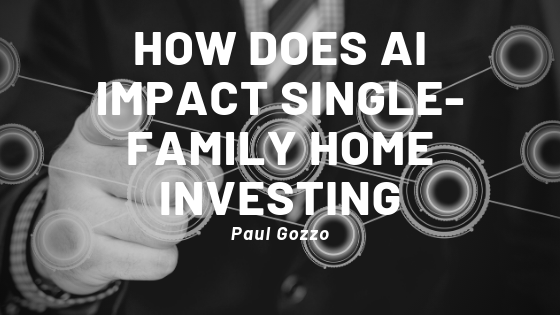While there have been many technological improvements for single-family real estate investors over the past several years, most geared at making access easier for smaller investors, nothing has had a significant impact leading to the possibility of changing access to the asset class as we know it. However, an introduction of AI into single-family real estate investing community may be the change that improves the daily function of this specific real estate asset class making it even easier and more straight forward for smaller investors. How does AI impact single-family home investing?
Improve search results for clients/investors:
When anyone is looking to invest in a property, their first instinct is to check the listing online along with any applicable pictures of the home. There are many factors that single-family real estate investors look for in a home including location, the price per square footage, the amenities the property has to offer, and the number of bedrooms. For many investors who do this on their own, it can be exhausting and time-consuming sifting through all the single-family properties for sale. Where AI comes in and makes the process much smoother is it narrows the search for investors and homebuyers alike while determining what the investor/consumer truly desires in a property. Machine learning will be able to track users’ different search criteria and filter it down even further, creating a personalized search for investors/homebuyers.
Predict appraisal and market values:
Think of Zillow’s, “Zestimate” for example; it has become the de facto first look for learning a home’s actual value as determined by Zillow. While not always entirely accurate this tool has become much more accurate and will continue to improve over time as more data is collected on Zillow’s platform. And going forward, one thing that should improve helping a new real estate investor who may struggle with fear of the unknown is the ability to predict the future value of homes. With more data collected over time, AI can help mitigate this issue, by using a combination of CRM and current marketplace data such as trends to predict the future value of a specific property. Some of the factors that play into the data analyzed by the AI are transportation, criminal activity in the area, the ranking of the local schools and marketplace activity including business development and residential development all of which would be entirely too time-consuming for a part-time investor. In the future, this type of information will be more accurate and readily available to the point that the AI allows both homebuyers and investors to feel more at ease about the decision they are making when purchasing a property.
Restructure the transaction:
Certain systems including blockchain are being introduced into the real estate industry. Blockchain allows for the seamless rapid movement of money from one end into another while remaining more secure than most real estate transactions handled today. Blockchain and AI would make a great combination together, as the efficient processing done by blockchain combined with the machine learning of AI would help investors close deals much smoother and sooner. However, this particular cohort of real estate, single family residential, has been operating in the same basic way for the past 50+ years so real change will take time and while technology is helping to speed up the collection of data and decision making, it will take time for entrepreneurs to present that to the industry and for those effects to take place. It has started and will continue to shift over time.

